Key takeaways:
- Understanding the querying process requires research, strategy, and emotional readiness; a well-crafted query letter reflects the author’s effort and passion.
- Timing is crucial after editing; waiting can provide a fresh perspective and enhance confidence before querying.
- Personalization of queries by addressing agents by name and referencing their preferences fosters genuine connections.
- Following up on queries can demonstrate professionalism, and including new insights can reignite agent interest.
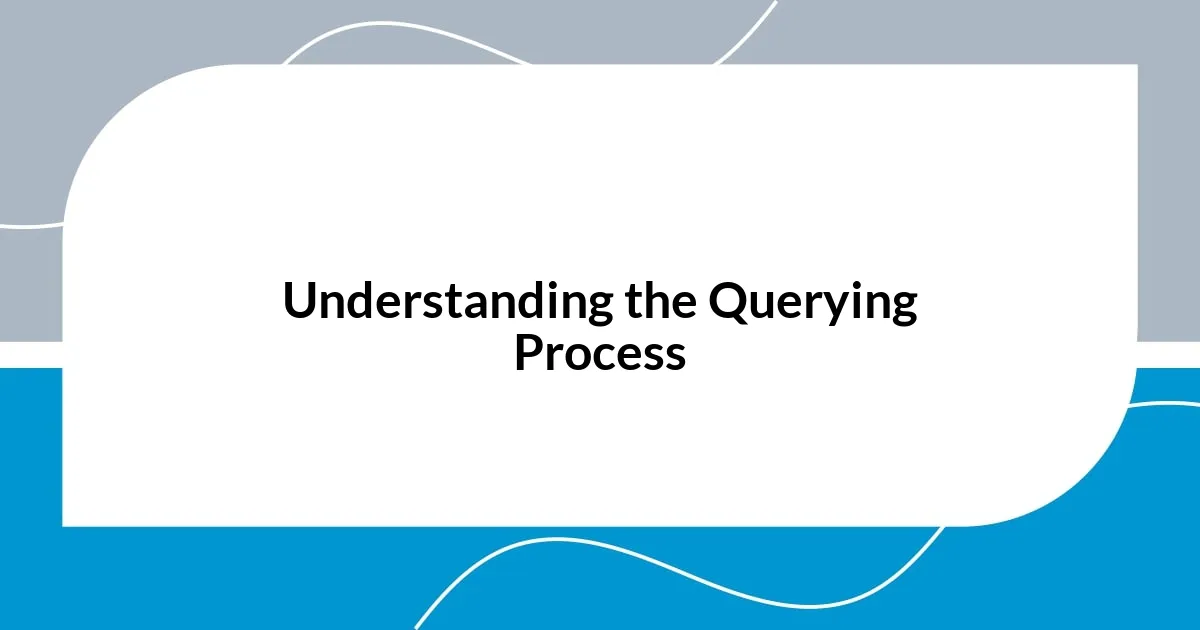
Understanding the Querying Process
Querying can often feel like a daunting maze, especially after investing so much time in editing your work. I remember sitting in front of my computer, second-guessing every word in my query letter. It made me realize that the process isn’t just about finding the right agent; it’s about presenting your best self and showcasing your unique voice.
What I’ve learned over time is that understanding the querying process involves a mix of research, strategy, and a dash of courage. Have you ever wondered how some authors seem to land that coveted agent connection while others struggle? I used to think it was a lucky break, but now I understand that each query is a reflection of the effort and heart you put in.
An effective query goes beyond mere formality; it’s your first opportunity to connect with an agent and hook them with your story. When writing mine for the first time, I broke it down into manageable components and focused on what truly excited me about my manuscript. This way, I crafted a genuine letter that not only shared the plot but also conveyed my enthusiasm. Isn’t it fascinating how pouring your passion into these few short paragraphs can make a lasting impact?
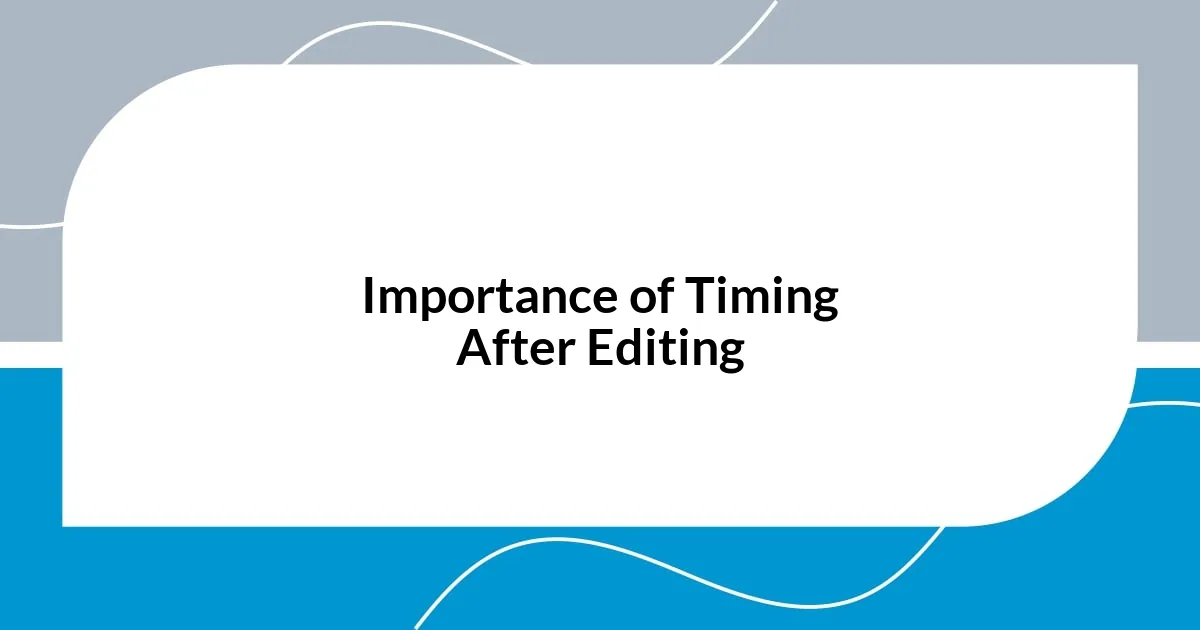
Importance of Timing After Editing
Timing after editing is crucial. I’ve found that waiting a bit before querying can offer you fresh perspective. After spending countless hours editing, stepping away allows me to see my work with new eyes, catching blunders I previously overlooked. It’s like when I wait a few days before revisiting a piece; I can immediately spot words that don’t fit or sentences that could shine brighter.
In my experience, taking this time can also help you manage your emotions. After editing, it’s easy to feel anxious about sending your work out into the world. Allowing some time helps to stabilize those feelings, giving you a clearer mindset. The anticipation can sometimes cloud judgment—have you ever felt like you rushed into something too early? Personally, I’ve done that, and the regret of not taking a pause lingered far too long.
Additionally, timing can affect how agents perceive your enthusiasm. When I finally feel ready to query, I’ve learned to approach it with justified confidence instead of the frantic energy that comes from hurrying the process. This emotional shift reflects in my letters, capturing a genuine excitement that resonates with the reader. If you’re deliberate about when you choose to send that query, the overall energy of your approach can shift dramatically.
| Timing | Impact on Querying |
|---|---|
| Immediate | Possible overwhelm; missed errors |
| Short Delay | Fresh perspective; reduced anxiety |
| Long Delay | Enhanced confidence; refined approach |
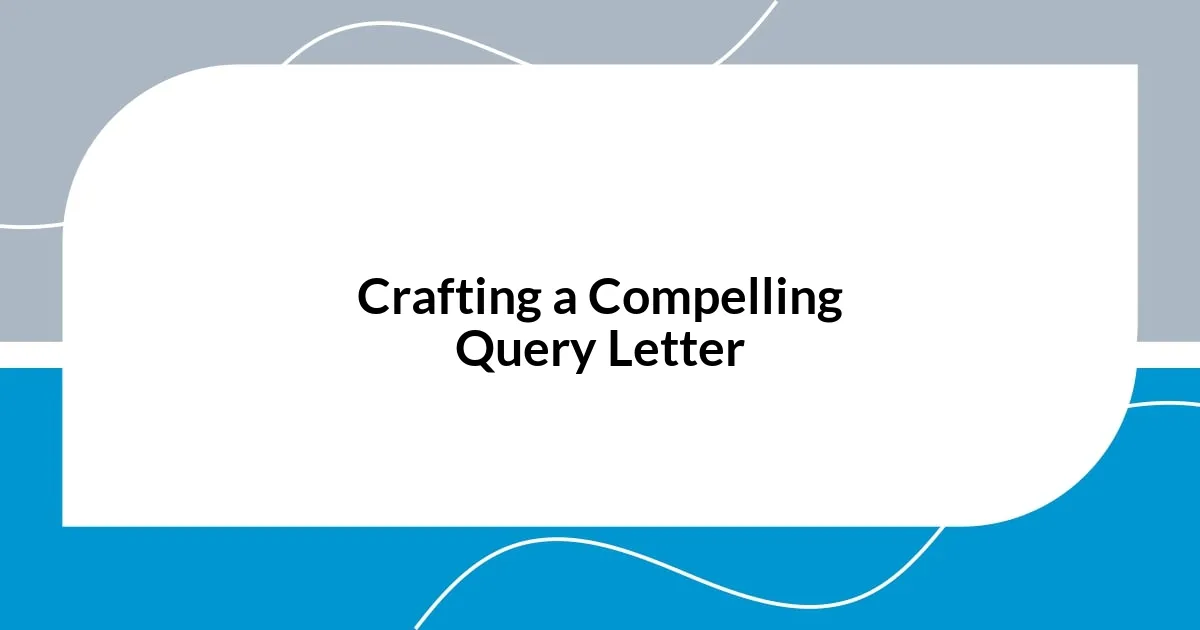
Crafting a Compelling Query Letter
When crafting a compelling query letter, I’ve found that clarity and conciseness are key. I remember staring at my first draft, overwhelmed by the urge to include every detail about my manuscript. It was only when I trimmed the fluff and zeroed in on the heart of the story that I felt the excitement seeping back into my words. Less truly becomes more; I focused on telling the agent exactly what makes my story unique without overloading them with information.
To create a strong impact, consider these essential elements:
- Hook: Start with a captivating opening that intrigues the agent.
- Brief Synopsis: Clearly outline your plot in a few sentences, giving a taste of the journey.
- Compelling Characters: Introduce your main character(s) and their stakes to create emotional investment.
- Comparative Titles: Mention similar successful books to position your work within the market context.
- Personal Touch: Share a brief connection to the story—what inspired you or what makes you the right person to tell it.
Engaging agents is about drawing them in from the very first line. By stripping my letter down to its elements, I uncovered the genuine connection that my manuscript holds, allowing those feelings of passion and purpose to shine through. Each word mattered, and I relished the craft of distilling my narrative into a clear, inviting pitch.
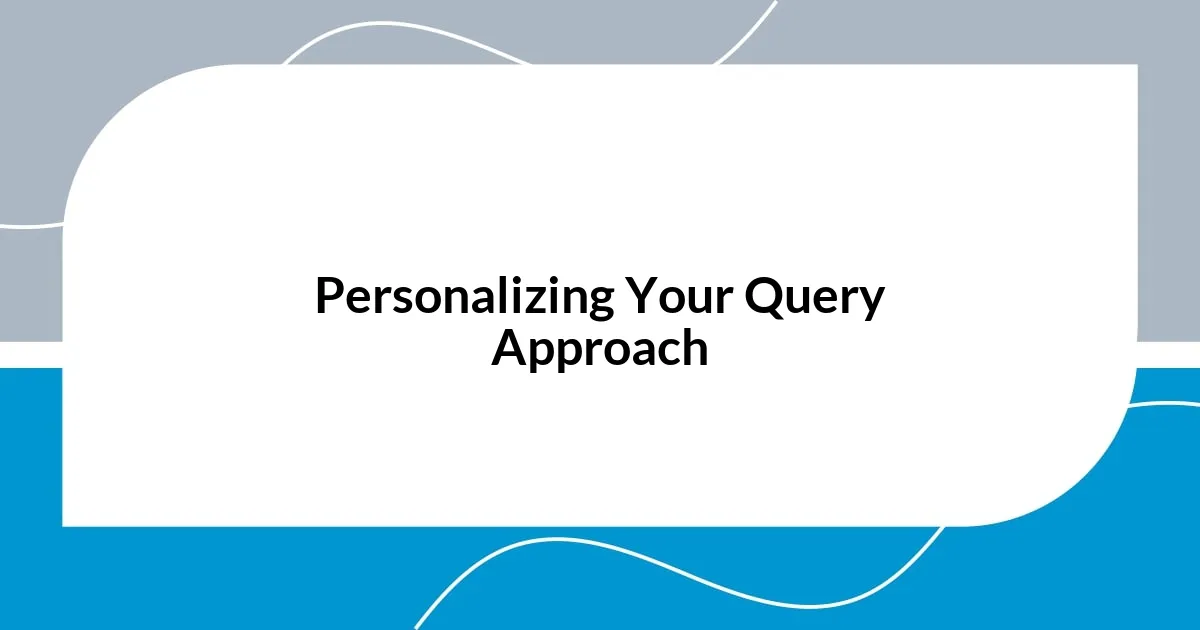
Personalizing Your Query Approach
Personalizing your query approach is about connecting with the agent on a deeper level. I remember when I wrote my first query—I was rigid, just throwing my manuscript details at them. It didn’t resonate at all. But then I discovered the power of authenticity. I started to infuse my unique personality into the query. Sharing my experience with a relatable anecdote helped me forge a connection right away. Have you ever realized how a simple, personal touch can make your words more engaging?
As I tailored my queries, I found that addressing the agent by name and mentioning specific details about their preferences were game-changers. It took a bit of research, but when I included a line about why I thought they’d connect with my story, it felt like I was inviting them into a conversation. This approach made me feel more confident, and suddenly, I wasn’t just a stranger sending a cold email; I became a writer inviting them into my world. It’s amazing how such small adjustments can showcase genuine interest.
Moreover, I’ve learned to express my understanding of the market, weaving elements of how my work aligns with current trends or themes they appreciate. For instance, referencing similar titles or themes can create a familiar context, demonstrating that I recognize the nuances of their taste. I felt a sense of control and pride when I refined my queries this way. Have you ever tried deepening your connection by showcasing your knowledge of the agent’s past work? It truly elevates the conversation.

Following Up on Your Queries
Following up on your queries is an essential step that can often be overlooked. I remember the first time I hit “send” on a query—I felt a mix of excitement and dread. After what felt like an eternity, I couldn’t help but wonder, “Should I check in?” That uncertainty led me to explore the best practices for follow-ups, as I realized that a gentle nudge can sometimes be just what you need to spur a response.
When I decided to follow up on a previous submission, I chose to wait the appropriate time—typically around two to four weeks, depending on the guidelines provided by the agent. I crafted a short, polite email, expressing my continued interest and lightly reminding them of my manuscript. What surprised me most was the immediate warmth I felt when I received a positive response. It reinforced my belief that agents appreciate professionalism and enthusiasm; it essentially told me that my humble little check-in might have made their day a touch brighter.
I’ve learned that it’s all about timing and tone. If you sense that a follow-up might feel too pushy, consider including a new insight about your project or share any recent developments in your writing journey. For instance, I once included an update about a writing award I received after querying, and it sparked renewed interest from the agent. Have you thought about how something as simple as a follow-up can open unexpected doors in your querying adventure? It’s a reminder that building relationships in this industry often requires a bit of persistence and thoughtful communication.
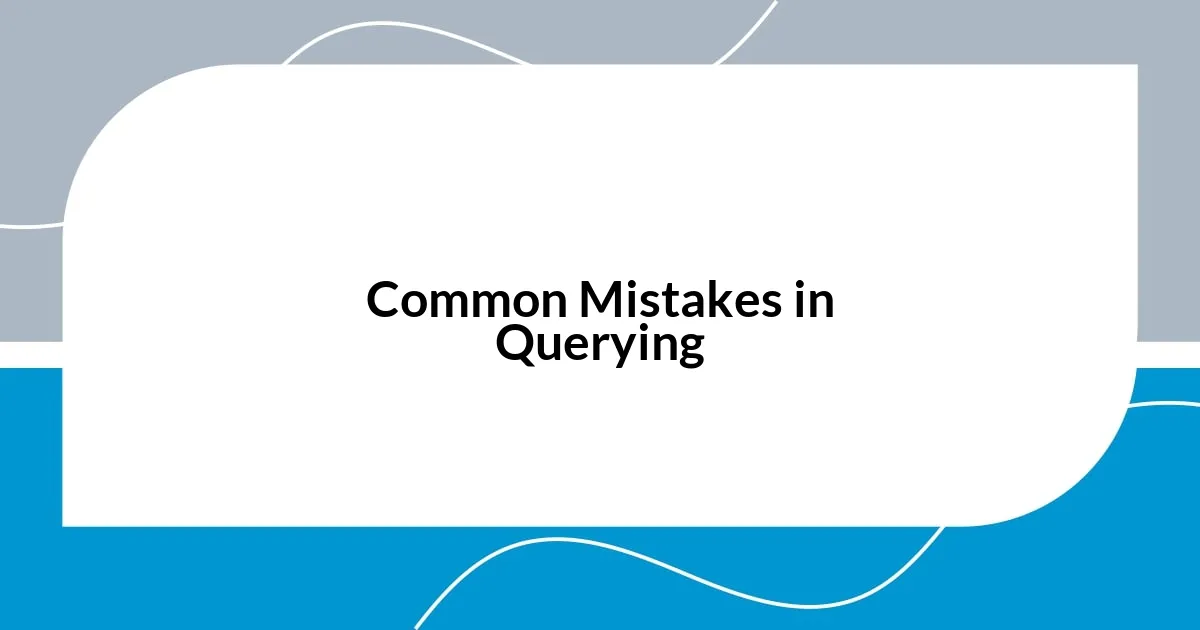
Common Mistakes in Querying
One of the most common mistakes I’ve seen is when writers fail to carefully read the submission guidelines. I’ve been there—once, I hastily sent a query that didn’t match the agent’s specific preferences, and it felt like a gut punch when I received that standard rejection. Taking a moment to double-check requirements can save not only time but also the disappointment of being overlooked due to a simple oversight. Have you ever noticed how essential these details can be?
Another frequent slip-up is neglecting to proofread the query letter. There was a time I sent out a query with a glaring typo in the first sentence. I vividly remember the sinking feeling as I hit “send.” It made me realize that even the slightest mistake could undermine my professionalism. It’s vital to read your query out loud or have someone else look it over—fresh eyes can spot errors that we often miss. Have you considered how fresh perspectives can refine your work?
Lastly, many writers tend to over-explain their plots in queries. I once went on for several paragraphs about character backstory and twist endings. Looking back, I recognized that agents prefer concise pitches that tease the story rather than reveal everything. It’s crucial to draw them in with just enough intrigue. Have you thought about how less can sometimes be more when it comes to capturing attention? By honing in on the core essence of your story, you create a space for curiosity, inviting agents to want to know more.
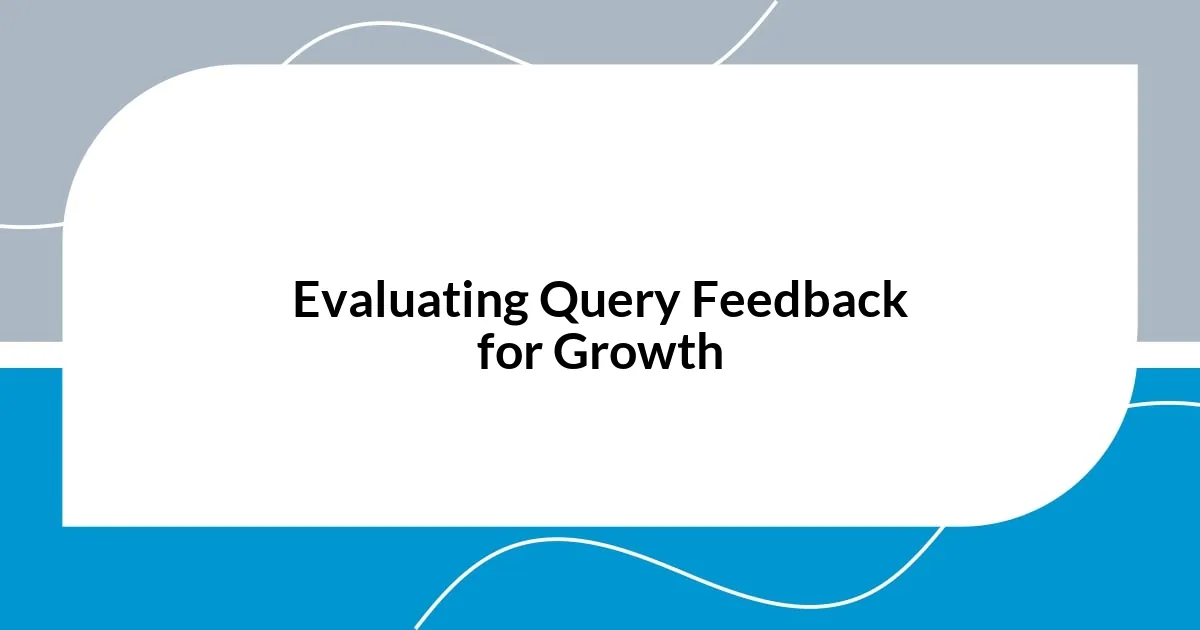
Evaluating Query Feedback for Growth
When it comes to evaluating query feedback, I’ve discovered it’s just as much about mindset as it is about content. The moment I received feedback from a literary agent, I initially felt a surge of disappointment. But, after sitting with those notes, I learned to see them as stepping stones rather than setbacks. Have you ever considered how these insights can actually fuel your growth as a writer? By adopting a growth mindset, I transformed what could have been a defeat into an opportunity to hone my craft.
During one particular journey, I received a critique that pointed out a lack of clarity in my premise. At first, I was defensive, but I realized the agent was trying to help me reach my audience more effectively. After diving into the feedback, I took the time to rewrite my query, focusing on clarity and impact. It’s fascinating how often I find that poignant feedback, when embraced, reveals hidden strengths in our stories. Have you had moments where feedback reshaped your perspective on your work?
Moreover, tracking the feedback over time has had a profound influence on my writing. I started maintaining a feedback journal, documenting insights and trends I noticed. This practice not only highlighted recurring themes in the feedback but also showcased my progress as I revised and resubmitted queries. There’s something incredibly empowering about seeing your growth laid out on paper. Have you tried this approach? By reflecting on how feedback has shaped my journey, I’ve come to appreciate the learning experience more than the immediacy of the rejections themselves.